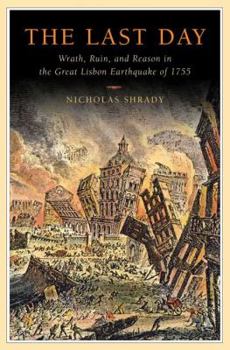The Last Day: Wrath, Ruin, and Reason in the Great Lisbon Earthquake of 1755
Select Format
Select Condition 
Book Overview
A riveting history of how the cataclysmic Lisbon earthquake shook the religious and intellectual foundations of Enlightenment Europe Along with the volcanic destruction of Pompeii and the 1906 San... This description may be from another edition of this product.
Format:Hardcover
Language:English
ISBN:0670018511
ISBN13:9780670018512
Release Date:April 2008
Publisher:Viking Books
Length:228 Pages
Weight:0.65 lbs.
Dimensions:0.9" x 6.5" x 8.6"
Age Range:18 years and up
Grade Range:Postsecondary and higher
Customer Reviews
2 ratings
Slightly pedantic, but still a good read
Published by Thriftbooks.com User , 14 years ago
If you are looking for the kind of 'you are there' description of the earthquake and the fire and tsunamis that followed, you will not really find that here. However, this still is a very readable and interesting book, linking the Lisbon earthquake to a host of interrelated topics including: how this disaster was truly the first national disaster with an international charitable relief response, how awareness of this disaster challenged current religious and philosophical views (and led Voltaire to write his greatest work criticizing then popular "Optimism") and how the history of the Iberian lands led to the politics surrounding the rebuilding of Lisbon. The backdrop of Portugese history alone is worth the read.
A Disaster Like No Other
Published by Thriftbooks.com User , 16 years ago
The earthquake that hit Lisbon on 1 November 1755 shook up a lot more than its buildings and citizens. There were repercussions for science, religion, philosophy, politics, and literature. In _The Last Day: Wrath, Ruin, and Reason in the Great Lisbon Earthquake of 1755_ (Viking) Nicholas Shrady gives a compelling short account of the disaster itself, and the history of the events leading up to it, but spends far more of the pages in a fascinating description of the effects of the quake in local and global history. There have been bigger disasters, even in our own times, but this one was not only big, but it made gigantic differences even in the way humans looked at their place in the world. Shrady says that because of this particular disaster in a particular place, all people all over the world "from staunch clerics to enlightened philosophers were compelled to re-examine their most cherished dogmas." We are still living with some of the changes the earthquake wrought. José I may have been king, but Portugal was largely ruled by the church which was the largest landowner and which supported the justly-feared Holy Office of the Inquisition. Every traveler noted how pious the inhabitants were, but many of them were in church when the disaster began, first with tremors, then violent waves from the sea, then from fire from all the household fireplaces that were beneath the collapsed buildings. Ten percent of the populace was wiped out. As in all disasters or diseases, there were those who knew that God was sending a message to those afflicted. The message, however, did not make sense. Lisbon was no worse than any large city, and demonstrably more pious than the others. The flawed hero of this book, the Portuguese Secretary of State, Sebastião Carvalho, realized that blaming people's sinfulness for the disaster would only undercut his efforts to bring them together to surmount it. The changes in thinking were not just religious, but more broadly philosophical. The most famous changes came in Voltaire's reaction to the ideas of Leibnitz, who reasoned that if the world was the product of a benevolent and all-powerful God, then it must be the best of all possible worlds, no matter how hard it is for us to see the goodness. In 1759, Voltaire published _Candide_, a rollicking, bawdy, fast-moving tale of inexplicable ups-and-downs, including the main characters' presence in the Lisbon earthquake. The book made fun not only of Leibnitz's philosophy, but of the Church, the Inquisition, the nobility, the military, and more. It isn't surprising that governments tried to suppress it, and also not surprising that it became a bestseller. There was no sense in trying to figure out how the world is the best possible one, the book shows; we must simply get on with the duties of our lives. It was a stylistic death-blow to deistic optimism. It also was part of a new mood of skepticism that encouraged scientific explanations of catastrophes rather th





